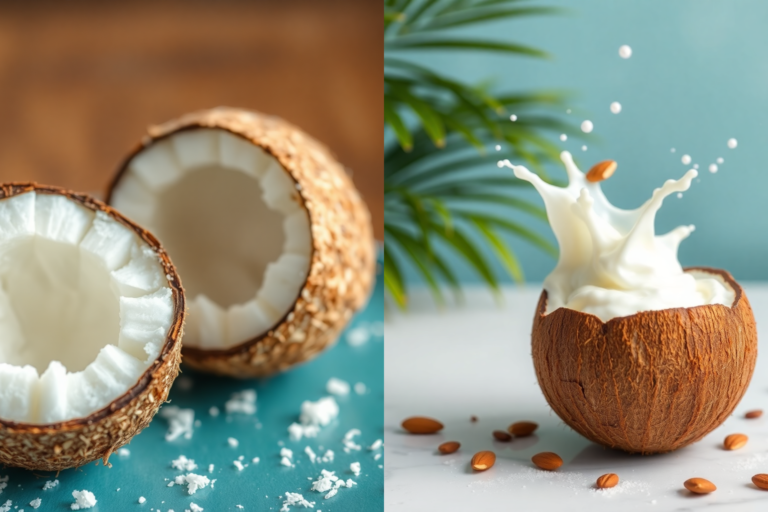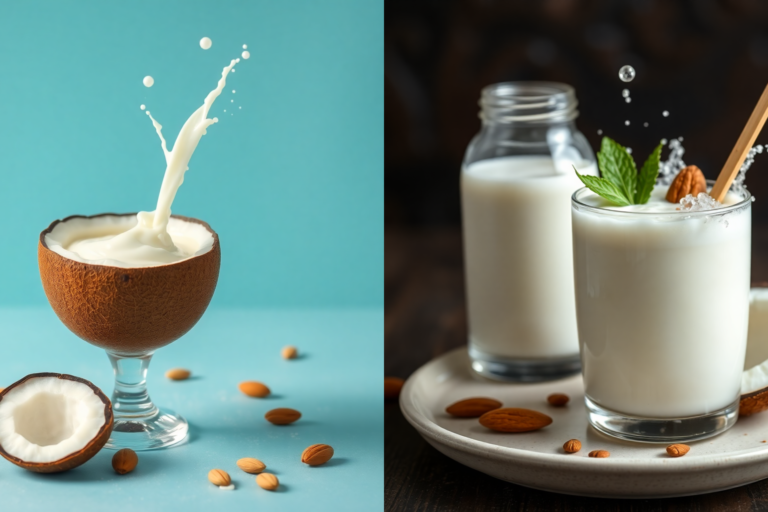Introduction to Grated Coconut: A Versatile Ingredient for Cooking and Baking
Grated Coconut has long been a staple in kitchens worldwide, particularly in tropical regions where coconuts are abundant. This ingredient, derived from the flesh of mature coconuts, is shredded or grated into fine pieces that add texture, flavor, and nutrients to a wide range of dishes. Whether used in cooking or baking, grated coconut offers a unique blend of natural sweetness and coconut flavor, making it a favorite in both savory and sweet recipes.
The Popularity of Grated Coconut in Cooking and Baking
Grated coconut is beloved for its versatility, enhancing a variety of culinary creations. In baking, it adds a rich flavor and moisture to recipes like coconut cakes, muffins, and cookies. Its slightly chewy texture and subtle sweetness make it perfect for incorporating into desserts, such as coconut macaroons, pies, and even bars. Additionally, grated coconut is often used in savory dishes, especially in Indian, Thai, and Caribbean cuisine, where it adds richness and depth to curries, stews, and soups. The unique texture of grated coconut also works as a coating for fried foods, providing a crispy, golden exterior.
Beyond its delightful flavor and texture, grated coconut offers significant nutritional benefits that contribute to its growing popularity in health-conscious circles.
Nutritional Value of Grated Coconut
When it comes to nutritional value, grated coconut is a powerhouse. It is high in healthy fats, particularly medium-chain triglycerides (MCTs), which are easily digestible and provide a quick energy source. Additionally, grated coconut is rich in fiber, which supports digestive health and helps maintain a healthy weight. The vitamins found in grated coconut—including vitamin C, vitamin E, and several B vitamins—help to boost the immune system, promote healthy skin, and support overall well-being.
Furthermore, grated coconut contains important minerals such as potassium, magnesium, and iron, which contribute to maintaining heart health, regulating blood pressure, and promoting proper muscle and nerve function. Its high antioxidant content also helps to reduce inflammation and protect against oxidative stress, making it a valuable addition to any diet.
Health Benefits of Grated Coconut
The health benefits of grated coconut are numerous and compelling. For those looking to improve digestion, the high fiber content in grated coconut aids in bowel regularity and helps prevent constipation. Additionally, the healthy fats in grated coconut can help raise HDL (good) cholesterol levels, thereby supporting heart health and reducing the risk of cardiovascular diseases.
As a natural source of energy, grated coconut is an excellent addition to smoothies, energy bars, or as a topping for yogurt, providing a sustained energy boost throughout the day. Its unique nutrient profile also makes it beneficial for weight management, as the combination of fiber and healthy fats helps to promote satiety, preventing overeating.
Grated Coconut: Health Benefit #1 – Rich in Healthy Fats
Grated Coconut: A Source of Medium-Chain Triglycerides (MCTs)
Grated coconut is not only a flavorful addition to your dishes but also a powerhouse of nutrients, particularly healthy fats. One of the key components in grated coconut is its high content of medium-chain triglycerides (MCTs), a type of fat that offers numerous health benefits. These MCTs are easily absorbed by the body and quickly converted into energy, making grated coconut a great choice for boosting overall vitality.
How MCTs in Grated Coconut Promote Metabolism and Energy
The MCTs found in grated coconut have been shown to promote an efficient metabolism. Unlike long-chain fats, MCTs are rapidly absorbed and sent straight to the liver, where they are converted into ketones. This process provides an immediate source of energy, unlike other fats that require more time to break down. When you include grated coconut in your diet, you’re not just adding flavor—you’re supporting your body’s natural ability to burn fat for fuel, leading to increased energy levels.
Brain Function and Cognitive Health with Grated Coconut
Another remarkable benefit of the MCTs in grated coconut is their positive effect on brain function. MCTs are known to enhance cognitive abilities by providing a quick, efficient source of energy for the brain. Studies have shown that ketones produced from MCTs can help improve mental clarity, focus, and overall brain health. Whether you’re looking to boost concentration during work or improve cognitive function with aging, grated coconut’s healthy fats play an essential role in supporting brain health.
Why Choose Grated Coconut for Your Health and Energy Needs?
Incorporating grated coconut into your daily diet can provide a natural energy boost, aid in weight management by promoting fat metabolism, and support brain health with the help of MCTs. Whether sprinkled on your morning smoothie or added to a savory curry, the benefits of grated coconut go beyond its delicious taste—it’s a simple and effective way to improve your overall well-being.
Conclusion: The Power of Grated Coconut’s Healthy Fats
Grated coconut is a remarkable source of medium-chain triglycerides, making it an excellent choice for anyone looking to enhance their energy, metabolism, and brain function. So, consider adding grated coconut to your meals for a delicious, nutritious boost that supports your body’s natural processes.
Health Benefit #2: High in Dietary Fiber – Grated Coconut
The High Fiber Content of Grated Coconut
Grated coconut is an excellent source of dietary fiber, making it a valuable addition to any diet. Fiber is a crucial nutrient for maintaining good health, and grated coconut is a natural and delicious way to incorporate this essential nutrient into your meals. Whether used in cooking, baking, or as a topping for smoothies, grated coconut provides a rich fiber boost, promoting a wide range of health benefits.
How Fiber in Grated Coconut Helps with Digestion
The fiber content in grated coconut plays a vital role in supporting healthy digestion. Fiber is essential for the proper functioning of the digestive system, as it adds bulk to stool, facilitating smoother bowel movements. This helps prevent constipation and promotes regularity, making grated coconut an excellent choice for maintaining digestive health.
The soluble and insoluble fiber found in grated coconut works together to improve the efficiency of the digestive process. Insoluble fiber aids in moving food through the digestive tract, while soluble fiber absorbs water and forms a gel-like substance, which can help regulate digestion and prevent bloating.
Grated Coconut and Gut Health
Grated coconut is not only good for digestion but also supports overall gut health. A healthy gut is essential for nutrient absorption, immune function, and even mental well-being. The fiber in grated coconut acts as a prebiotic, nourishing the beneficial bacteria in the gut. These bacteria help break down food, produce essential nutrients, and maintain a balanced gut microbiome, which is linked to a healthier immune system and better mood regulation.
Regular consumption of grated coconut can help maintain a balanced gut environment, which is crucial for overall health. A fiber-rich diet, especially with natural sources like grated coconut, supports the growth of good bacteria while keeping harmful bacteria in check.
Maintaining Healthy Blood Sugar Levels with Grated Coconut
Another remarkable benefit of the high fiber content in grated coconut is its ability to help regulate blood sugar levels. Fiber slows the absorption of sugars and carbohydrates in the digestive system, preventing sudden spikes in blood sugar. This is especially beneficial for individuals with diabetes or those at risk of developing the condition.
The soluble fiber in grated coconut helps stabilize blood sugar by forming a gel-like substance that slows the rate at which food moves through the stomach and intestines. This leads to a more gradual release of sugars into the bloodstream, preventing the rapid fluctuations in blood sugar levels that can lead to energy crashes and cravings.
Health Benefit #3: Packed with Essential Nutrients Found in Grated Coconut
Grated Coconut: A Rich Source of Essential Nutrients
Grated coconut is not only delicious but also packed with essential vitamins and minerals that contribute significantly to your overall health. These nutrients play a vital role in supporting various bodily functions, from immune health to bone strength. The versatility of grated coconut makes it a valuable addition to a well-balanced diet. Below, we explore the key vitamins and minerals found in grated coconut and how they contribute to your health.
Grated Coconut and Vitamin C: Boosting Immunity
One of the most significant nutrients found in grated coconut is vitamin C. While coconut is not as rich in vitamin C as some fruits like oranges, it still provides a valuable contribution. Vitamin C is essential for boosting the immune system, helping to protect against illnesses and infections. It also plays a critical role in the production of collagen, which is necessary for healthy skin, cartilage, and blood vessels. Consuming grated coconut regularly can help maintain your body’s natural defenses and support overall health.
Grated Coconut for Strong Bones: The Importance of Calcium and Magnesium
Grated coconut is also a great source of calcium and magnesium—two minerals that are essential for maintaining strong, healthy bones. Calcium is known for its role in building and maintaining bone structure, while magnesium helps to regulate calcium levels in the body and supports proper muscle and nerve function. Together, these minerals make grated coconut an excellent addition to your diet for supporting bone health, especially for those at risk of osteoporosis or bone-related issues.
Iron and Potassium in Grated Coconut: Energy and Heart Health
Another pair of important nutrients in grated coconut are iron and potassium. Iron is crucial for the production of hemoglobin, which carries oxygen throughout the body. A lack of iron can lead to anemia, resulting in fatigue and weakness. Consuming grated coconut helps to meet your iron needs, ensuring your body has enough oxygen to function efficiently.
Potassium, on the other hand, plays an essential role in regulating blood pressure and maintaining heart health. A diet rich in potassium can help reduce the risk of hypertension and support overall cardiovascular function. Grated coconut is a natural source of this vital mineral, helping you maintain a balanced and healthy lifestyle.
Grated Coconut: A Complete Nutritional Powerhouse
With its abundance of vitamin C, calcium, magnesium, iron, and potassium, grated coconut stands out as a nutritional powerhouse. These essential nutrients support various aspects of health, from immune function and bone strength to heart health and energy levels. Incorporating grated coconut into your daily meals can be a simple and delicious way to boost your nutrient intake and improve your overall well-being.
By adding grated coconut to your diet, you’re not only enjoying its rich, nutty flavor but also reaping the full benefits of its essential vitamins and minerals. Whether in your smoothies, desserts, or savory dishes, grated coconut is a versatile and nutrient-packed addition to any diet.
Health Benefit #4: Supports Heart Health – Grated Coconut’s Role in Promoting a Healthy Heart
Grated Coconut and Heart Health: A Powerful Duo
Grated coconut is not just a delicious addition to various dishes; it plays a significant role in promoting heart health. This tropical food is packed with essential nutrients, including healthy fats, that can positively influence cholesterol levels, improve blood circulation, and enhance overall cardiovascular health. In this section, we will explore the vital components of grated coconut that support heart health and how incorporating it into your diet can benefit your cardiovascular system.
The Role of Healthy Fats in Grated Coconut: Boosting HDL and Reducing LDL
Grated coconut is an excellent source of healthy fats, particularly medium-chain triglycerides (MCTs). These fats are different from the long-chain fats found in most other oils and fats, offering unique health benefits. MCTs in grated coconut have been shown to help improve the balance of cholesterol in the body.
Consuming grated coconut can lower bad cholesterol (LDL) levels and simultaneously increase good cholesterol (HDL) levels. HDL cholesterol is often referred to as “good” cholesterol because it helps remove LDL cholesterol from the bloodstream, thereby reducing the risk of heart disease and stroke. Grated coconut contains lauric acid, a type of MCT that supports the production of HDL cholesterol, leading to healthier arteries and improved heart function.
Incorporating grated coconut into your daily diet, whether in baking, cooking, or smoothies, can offer these cholesterol-lowering benefits, helping maintain optimal heart health over time.
Grated Coconut’s Impact on Blood Circulation and Cardiovascular Health
Beyond cholesterol regulation, grated coconut also plays a role in enhancing blood circulation, another critical aspect of cardiovascular health. The presence of fiber and healthy fats in grated coconut helps improve blood flow by reducing inflammation and preventing the buildup of plaque in the arteries. This leads to better circulation and a reduced risk of conditions like hypertension (high blood pressure) and atherosclerosis (narrowing of the arteries).
Grated coconut is also rich in antioxidants, which help fight free radicals in the body, further promoting healthy blood vessels and reducing oxidative stress. As a result, consuming grated coconut regularly may reduce the risk of heart-related diseases and contribute to a more efficient cardiovascular system.
How Grated Coconut Supports Long-Term Heart Health
The combination of healthy fats, fiber, and antioxidants in grated coconut makes it an excellent addition to a heart-healthy diet. By incorporating this natural food into your meals, you can help support long-term heart health and prevent many common cardiovascular issues.
Whether you’re using grated coconut in smoothies, baked goods, or as a topping for salads and curries, you’ll be providing your body with essential nutrients that support heart health. Additionally, because grated coconut is a natural source of healthy fats, it can replace other less beneficial fats in your diet, further promoting overall heart health.
Health Benefit #5: Promotes Skin and Hair Health with Grated Coconut
How Grated Coconut Improves Skin Hydration and Reduces Signs of Aging
Grated coconut is a powerhouse of healthy fats and antioxidants, making it an excellent choice for improving skin health. The natural oils found in grated coconut are rich in medium-chain fatty acids, such as lauric acid, which help to deeply hydrate the skin, keeping it soft and supple. This makes grated coconut a go-to ingredient for dry or dehydrated skin, offering long-lasting moisture.
The antioxidants present in grated coconut play a crucial role in protecting the skin from free radical damage. These free radicals are responsible for accelerating the aging process, leading to wrinkles and fine lines. The antioxidants in grated coconut help neutralize these harmful molecules, promoting a youthful appearance and preventing premature aging. Regular use of grated coconut in skincare routines can lead to visibly smoother and more radiant skin.
Benefits of Grated Coconut for Hair: Strengthening and Nourishing
Not only is grated coconut great for your skin, but it is also a fantastic natural remedy for your hair. The essential fatty acids in grated coconut help to nourish the scalp and strengthen hair follicles. Regular application of grated coconut can lead to improved hair texture and reduced hair breakage, making it an ideal solution for those struggling with brittle hair.
The vitamins and minerals found in grated coconut, including vitamin E, iron, and potassium, contribute to healthier hair growth. These nutrients improve blood circulation to the scalp, providing the necessary nourishment for strong and resilient hair. Additionally, the antimicrobial properties of grated coconut help prevent dandruff and other scalp issues, creating an optimal environment for hair growth.
When used as a hair mask or added to hair care products, grated coconut can improve overall hair health, promoting shine, strength, and volume.
How to Incorporate Grated Coconut Into Your Skincare and Haircare Routine
For skin health, you can incorporate grated coconut into homemade moisturizers, scrubs, and masks. Simply mix grated coconut with other natural ingredients like honey, yogurt, or aloe vera for a soothing and hydrating treatment. Leave the mask on for about 15-20 minutes, then rinse off with warm water to reveal soft, glowing skin.
For hair health, try applying grated coconut as a nourishing hair mask. Combine it with a bit of coconut oil or olive oil, then massage it into your scalp and hair. Leave the mask on for 30 minutes to an hour before rinsing it off. This treatment helps hydrate and strengthen hair from the roots to the tips.











